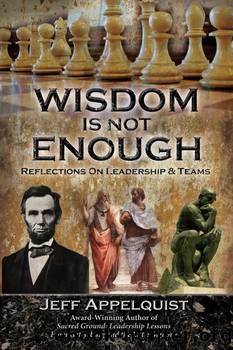Wisdom Is Not Enough by Jeff Appelquist

Author:Jeff Appelquist
Language: eng
Format: epub
ISBN: 978-1-59298-385-8
Publisher: Beaver's Pond
Published: 2011-12-15T00:00:00+00:00
Recognition of the potential adverse effects of the electronic bombardment that we all weather on a daily basis is the first step in dealing with the problem. Consciously and consistently creating time to focus and concentrate is the solution.
â CHAPTER TWENTY-ONE â
FRAME THE
CHALLENGE
CORRECTLY
âThe test of a first-rate intelligence is the
ability to hold two opposite ideas in mind
at the same time and still retain the
ability to function.â
â F. Scott Fitzgerald
In 1989, the venerable book publisher Encyclopedia Britannica generated $627 million in revenues by selling hard-bound encyclopedias priced at $1,300 per set. A mere five years later, sales had plummeted to less than $300 million. Other producers of encyclopedias had captured huge chunks of Britannicaâs market share by introducing CD-ROM options that allowed customers to peruse articles in a more interesting, flexible, and cheaper way. Britannica had been slow to adopt the new digital technology for the primary reason that it viewed itself as a book seller, rather than as a purveyor of knowledge and information that might be sold in many different forms. Company leadership stubbornly persisted in holding onto a frame for understanding its business that was woefully outdated. By the time Britannica recognized its mistake and took steps to recover, it nearly imploded. Leadership had failed miserably in one of its most fundamental responsibilities: the requirement to frame the challenge correctly.
What is a frame? Succinctly put, frames help us to simplify reality. Frames enable us to make sense of and understand the complex world that surrounds us. They are assumptions we make that allow us to determine how to expend our energy, what to focus on, and what to ignore. According to scholar Marvin L. Minsky, âThe terms frame and framing have their origin in cognitive science and artificial intelligenceâ¦. and refer to the mental representations that allow humans to perceive, interpret, judge, choose, and act.â The way that we frame a problem or a challenge has a potentially huge impact on how we communicate, approach solutions and, ultimately, make decisions. We all use frames constantly and they are incredibly important in facilitating our day-to-day functioning.
The problem lies in the fact that frames sometimes cause tunnel vision. We can become trapped in overly rigid frames. In short, as the leadership team at Encyclopedia Britannica so painfully discovered, frames can be occasionally dead wrong in ways that ultimately prove disastrous.
The words leaders use to communicate framing to their followers matter greatly. Studies demonstrate that even slight changes in the wording of a problem or challenge can have a significant impact on the way people respond. For example, a well-known study by Daniel Kahneman and Amos Tversky highlights the importance of decision frames. The researchers found that people are more inclined to take higher risks if a decision is framed with emphasis on a potential loss. Conversely, if a decision is framed with a positive emphasis on potential gain people tend to think more broadly and take fewer unnecessary chances. These results are true even when the practical outcome in either case is the same.
Download
This site does not store any files on its server. We only index and link to content provided by other sites. Please contact the content providers to delete copyright contents if any and email us, we'll remove relevant links or contents immediately.
Zero to IPO: Over $1 Trillion of Actionable Advice from the World's Most Successful Entrepreneurs by Frederic Kerrest(4567)
Machine Learning at Scale with H2O by Gregory Keys | David Whiting(4312)
Never by Ken Follett(3954)
Harry Potter and the Goblet Of Fire by J.K. Rowling(3856)
Ogilvy on Advertising by David Ogilvy(3621)
Shadow of Night by Deborah Harkness(3367)
The Man Who Died Twice by Richard Osman(3077)
Book of Life by Deborah Harkness(2938)
The Tipping Point by Malcolm Gladwell(2921)
Will by Will Smith(2919)
Purple Hibiscus by Chimamanda Ngozi Adichie(2853)
0041152001443424520 .pdf by Unknown(2845)
My Brilliant Friend by Elena Ferrante(2831)
How Proust Can Change Your Life by Alain De Botton(2814)
How to Pay Zero Taxes, 2018 by Jeff A. Schnepper(2655)
Hooked: A Dark, Contemporary Romance (Never After Series) by Emily McIntire(2553)
Rationality by Steven Pinker(2363)
Can't Hurt Me: Master Your Mind and Defy the Odds - Clean Edition by David Goggins(2339)
Borders by unknow(2313)
